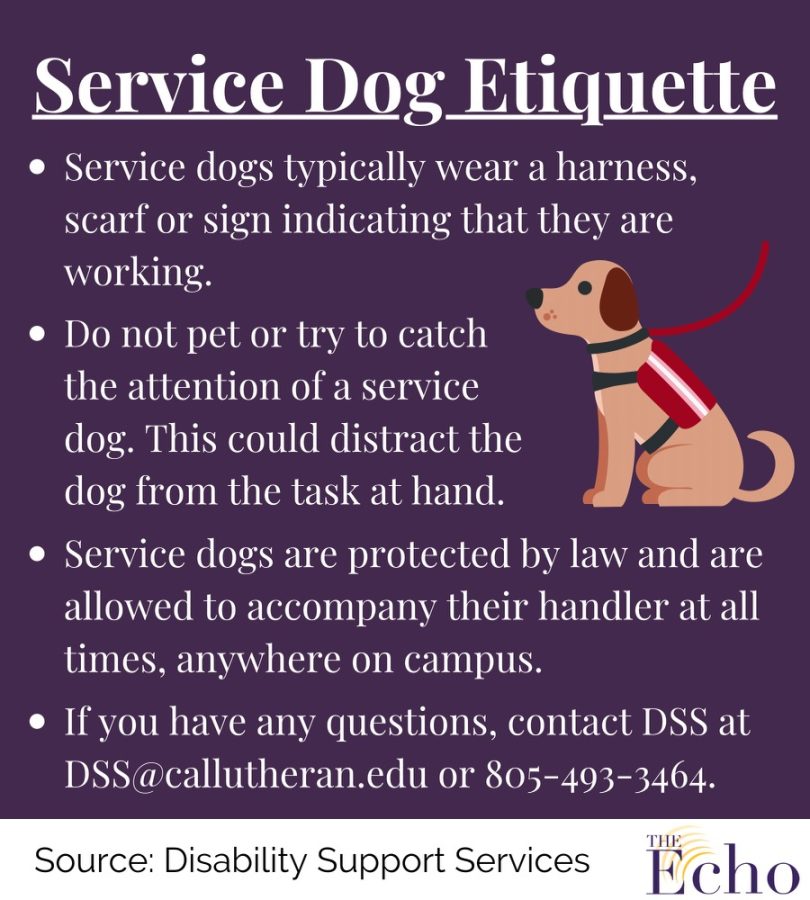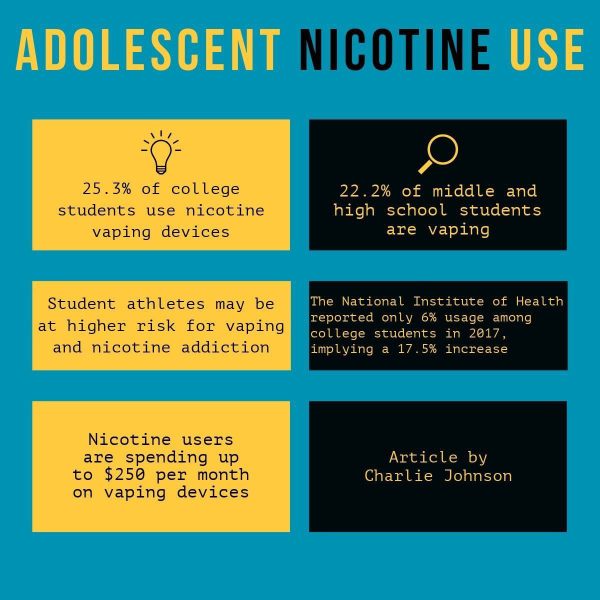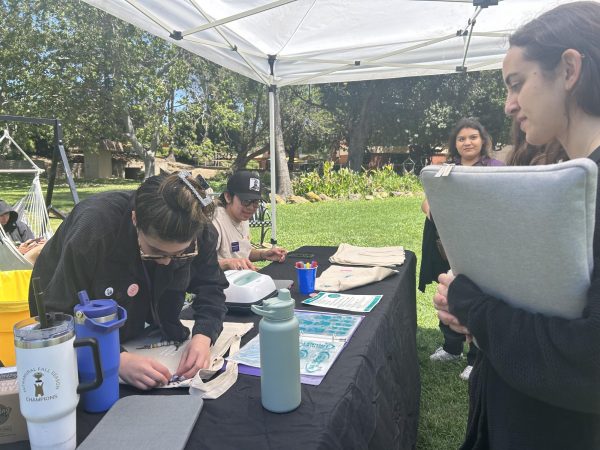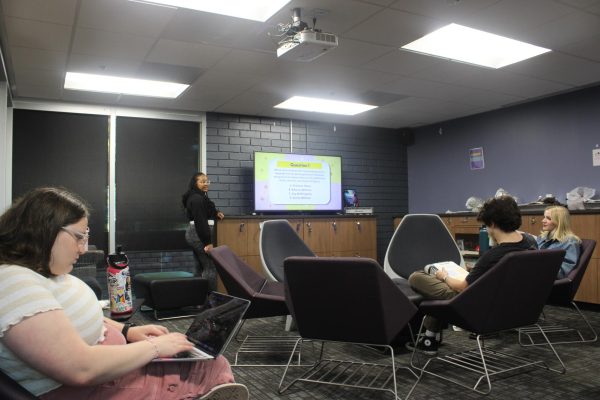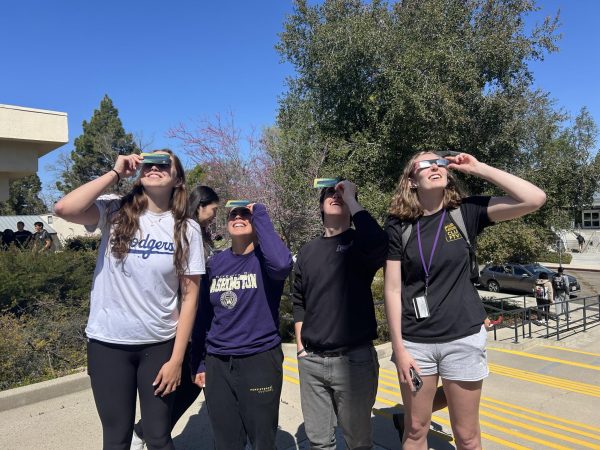Service Animals: ‘It’s super important to have an understanding that they are a tool for the owner”
March 7, 2023
According to the Service Dog Interaction handout from California Lutheran University’s Disability Support, “Service dogs are working dogs, not emotional support animals nor Pets.”
Director for Disability Support Services Wendy Jimenez said that using a service animal is like using a tool and that they should feel welcomed on our campus.
“In order to make them feel welcome, we need to be able to provide the necessary support to have the service dog there. I would say that it’s very important to keep the Cal Lutheran community growing and to just make that sensible,” Jimenez said.
In the handout, DSS says that you should not pet, speak to or try to catch the attention of a service dog. DSS also said that doing these things when the animal is working will distract the animal from the task at hand. Even if the service dog does not appear to be working, the handout says the presence of the harness, scarf or sign indicates that the dog is still on duty and should not be distracted. You are also allowed to ask the dog’s owner for permission to interact with the service dog, but the handout says that the best way to practice proper service dog interaction is to ignore the dog when it is working.
Jimenez said that there are appropriate and proper ways to interact with people who have service dogs which include ignoring the dog above all, though it can be hard at times. DSS also makes sure that places on campus such as the Student Union, Ullman Dining and Pearson Library are aware of how to interact with people who have service dogs.
“The biggest thing is, honestly, just making sure that the students using the service animals can reach out to our office for disability-related support and accommodations,” Jimenez said. “So just knowing that we’re here, we can provide support.”
In order to make the transition smoother for students living on campus, Jimenez said DSS helps students with service dogs by working with Residence Life. Jimenez said they coordinate housing and make sure the students’ roommates are okay with living with an animal. Also, Jimenez said professors are also notified if a student is using a service dog in a particular class so there are no questions regarding the use of the service dog to the student.
“Some of our students who use service dogs may not need any other accommodations at all, and some of them do,” Jimenez said.
First-year Christian Nelson has a black labrador retriever named Marty as his service dog, and he has had Marty for four years to assist with his Type 1 Diabetes. Nelson said Marty can smell changes in Nelson’s blood sugar before they happen, which makes him a great tool to have. In his first semester, Nelson said it was really nice to see an understanding around service dogs, such as signs at Ullman To-Go or Starbucks that educate others on accepting service dogs.
“Growing up with a service dog, I haven’t seen much inclusivity until the last couple of years around service dogs, just anywhere. But I think it’s super important to have an understanding that they are a tool for the owner,” Nelson said.
At Cal Lutheran, Nelson said that he hasn’t experienced many negative situations with others because most understand the rules regarding interacting with service dogs. If there are any negative experiences, Nelson said that they often have to do with the pet peeves that he has with people’s understanding of how service dogs operate.
“Every experience I’ve had in classes with teachers, with working with Disability Services has been so helpful in the process, getting things to work and making sure that I am comfortable with the environment that they have created for me,” Nelson said.
Nelson said that one of his biggest pet peeves as a service dog owner is when others talk to Marty in a “baby voice” and don’t ask to pet him. Overall, Nelson said that he has had a very positive experience with being a service dog handler at Cal Lutheran.
Nelson said his biggest advice for service dog owners is to have patience because it can be quite hard and others don’t truly understand the dog’s emotions, operations and reason for use. Nelson said general respect should be given to both the handler and the service dog, but that most people he has encountered have been very respectful to both him and Marty. He also said that advice to faculty or staff is to have an understanding of medical issues that service dog handlers have.
Nelson said that there is a fine line that people with service dogs walk, but that being able to teach people and share experiences with his disability is very helpful to the Cal Lutheran community. Nelson said he is appreciative of DSS for helping other kids on campus similar to him so no one feels left out. Because Nelson’s disease is invisible to others, he said that it is important that the Cal Lutheran community talks to and recognizes both him, his service dog and his disease.
“Just being able to talk to us and giving us examples to show people what our dogs and diseases are about is important,” Nelson said.
Nelson said that putting people in an environment where there are more service dogs will help them gain a better understanding of how to deal with service dogs in the future.
“It’s the same reason you diversify the campus, you don’t want to have one type of person because then other people will have a bias or an experience that distinguishes how you act around that kind of person. It just makes it so there is not this ableist idea of Type 1 diabetics and service dogs,” Nelson said.
Those who have questions or concerns regarding service dog interaction etiquette or further education on service dogs can feel free to contact DSS at [email protected] or call (805)-493-3464.

